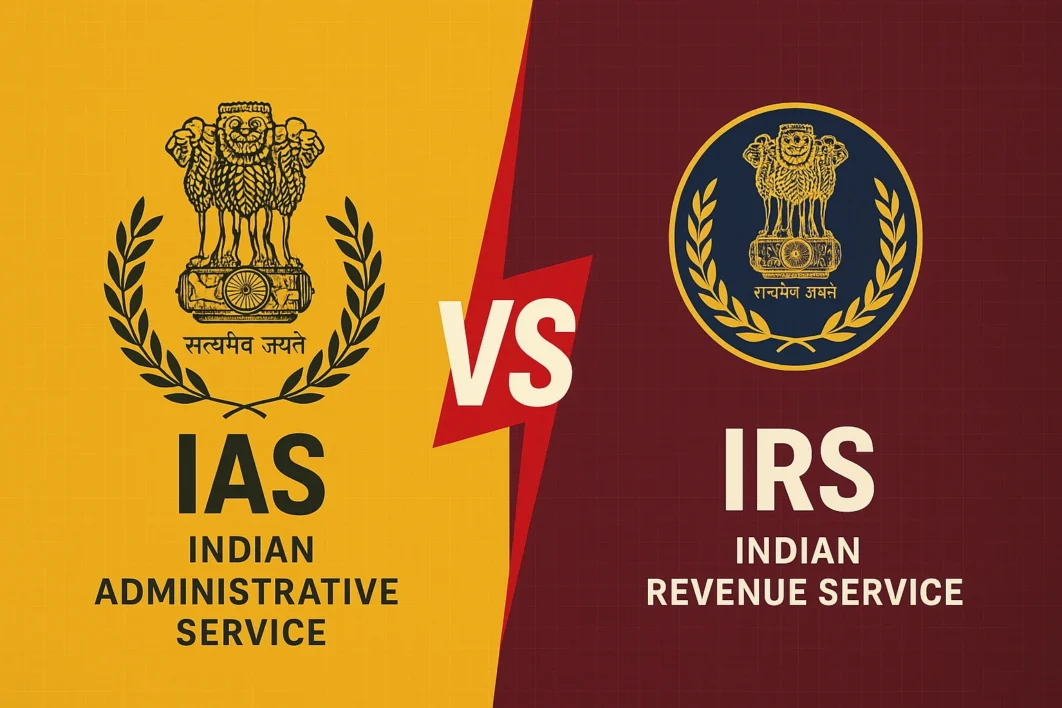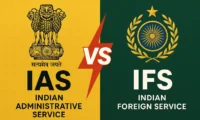IAS officers hold broader administrative authority with district-level governance and policy-making powers, while IRS officers specialize in tax administration, revenue intelligence, and enforcement.
- Choosing Between IAS and IRS
- IAS vs IRS: Quick Comparison Table
- 💖 You Might Also Like
- What is IAS?
- Role and Responsibilities
- A Typical Day for an IAS Officer
- What is IRS?
- Two Branches of IRS
- Nature of Work
- IAS vs IRS: Eligibility & Exam Differences
- ✨ More Stories for You
- IAS vs IRS: Training Differences
- IAS Training
- IRS Training
- Lifestyle During Training
- IAS vs IRS: Salary Comparison (Latest Data)
- Salary Breakdown
- Additional Perks
- IAS vs IRS: Power & Influence
- IAS: Administrative Supremacy
- IRS: Financial Enforcement Power
- Political Proximity
- Societal Impact
- 🌟 Don't Miss These Posts
- IAS vs IRS: Work-Life Balance
- IAS: Unpredictable and Demanding
- IRS: Structured and Predictable
- Family Considerations
- IAS vs IRS: Promotion Hierarchy
- IAS Promotion Path
- IRS Promotion Path
- Deputation Opportunities
- IAS vs IRS: Which Is Better for You?
- Choose IAS if you:
- Choose IRS if you:
- Personality Matters
- IAS vs IRS: Common Myths Debunked
- “Is IRS less powerful than IAS?”
- “Do IRS officers get CBI-like work?”
- “Can IRS become Secretary?”
- “Are IAS officers transferred more frequently?”
- “Is IRS salary lower than IAS?”
- Frequently Asked Questions
- Who has more power – IAS or IRS?
- Which service is better for salary and benefits?
- Are transfer issues more common in IAS than IRS?
- Is IRS more stable and less stressful than IAS?
- Can IRS officers become CBDT or CBIC chief?
- Which service offers better work-life balance?
- Do both services get equal respect in society?
- Can IRS officers work internationally?
- Conclusion
IAS offers wider societal impact but demanding work-life balance, whereas IRS provides specialized expertise with relatively predictable schedules. For future growth and power, IAS leads in administrative control and political proximity, while IRS excels in financial investigation and economic governance.
Choosing Between IAS and IRS
Every UPSC aspirant faces this critical question: IAS or IRS? Both services represent the pinnacle of administrative excellence in India, yet they differ significantly in authority, daily responsibilities, career trajectory, and lifestyle.
While IAS officers govern districts and shape policies at the grassroots level, IRS officers control the nation’s financial bloodstream through taxation and revenue intelligence. The confusion is natural—one offers the romance of district magistracy, the other the precision of financial enforcement.
This comprehensive guide breaks down every aspect to help you make an informed decision based on your career aspirations, personality, and long-term goals.
👉 Preparing for UPSC? Check the latest high-rated IAS preparation books here
IAS vs IRS: Quick Comparison Table
| Parameter | IAS | IRS |
|---|---|---|
| Recruitment | UPSC CSE (Top 100-120 ranks typically) | UPSC CSE (Ranks 120-500 typically) |
| Training | LBSNAA, Mussoorie (2 years) | NADT/NACIN (18-24 months) |
| Primary Role | District administration, policy implementation | Tax administration, revenue collection, investigation |
| Starting Salary | ₹56,100 + allowances | ₹56,100 + allowances |
| Promotions | Slower initially, faster at senior levels | Structured time-bound promotions |
| Power & Authority | Wide administrative control, district governance | Financial enforcement, investigation powers |
| Job Pressure | High (24/7 public accountability) | Moderate to High (audit deadlines, investigations) |
| Public Interaction | Extensive (janta darbars, field visits) | Limited (mostly professional/taxpayer dealings) |
| Work-Life Balance | Unpredictable, demanding | Relatively predictable |
| Transfers | Frequent (every 2-3 years) | Less frequent, more stable |
| Housing & Perks | Government bungalows, protocol status | Government housing, standard perks |
💖 You Might Also Like
What is IAS?

The Indian Administrative Service (IAS) is the premier civil service responsible for district administration, policy formulation, and governance across Union and State governments. IAS officers serve as the backbone of India’s administrative machinery, implementing government policies from grassroots to secretariat levels.
Role and Responsibilities
IAS officers begin their careers as Sub-Divisional Magistrates (SDMs) or Assistant Collectors, gaining field experience in rural administration. They handle law and order, development programs, disaster management, and public grievances. As they progress, they become District Magistrates (DMs) or District Collectors—the chief administrative authority of a district with magisterial, revenue, and developmental powers.
At senior levels, IAS officers serve as Divisional Commissioners, State Secretaries heading departments like Health, Education, or Finance, and eventually Joint Secretaries, Additional Secretaries, and Secretaries in the Government of India. The pinnacle position is Cabinet Secretary, the topmost bureaucrat advising the Prime Minister.
A Typical Day for an IAS Officer
A District Magistrate’s day starts early with district review meetings, followed by field visits to villages, project inspections, and janta darbars where citizens present grievances. Afternoons involve administrative file work, coordination with police and other departments, and evening meetings with elected representatives. Emergencies—floods, law and order situations, elections—demand round-the-clock availability.
👉 Check updated IAS study materials
What is IRS?

The Indian Revenue Service (IRS) is the economic service responsible for collecting and administering direct and indirect taxes, forming the financial backbone of the nation. IRS officers ensure revenue mobilization, tax compliance, and economic enforcement through two specialized branches: IRS (Income Tax) and IRS (Customs & Central Excise).
Two Branches of IRS
IRS (Income Tax): Officers work under the Central Board of Direct Taxes (CBDT), handling income tax assessments, investigations into tax evasion, prosecution of offenders, and policy formulation for direct taxation. They conduct surveys, searches, and maintain the integrity of India’s direct tax system.
IRS (Customs & Central Excise): Operating under the Central Board of Indirect Taxes and Customs (CBIC), these officers manage GST administration, customs clearance at ports and airports, anti-smuggling operations, international trade facilitation, and duty collection.
Nature of Work
IRS officers combine desk work with investigation. They analyze financial statements, conduct tax audits, investigate money laundering cases, and coordinate with intelligence agencies. Senior officers formulate tax policies, represent India in international forums, and head important positions like Chief Commissioner of Income Tax or Principal Commissioner of Customs.
Unlike IAS, IRS work is more specialized and technical, requiring deep understanding of taxation laws, accounting principles, and economic regulations. The service offers intellectual stimulation through complex financial investigations and significant contribution to national revenue—which funds all government schemes.
👉 IRS aspirants can also benefit from these UPSC preparation resources
IAS vs IRS: Eligibility & Exam Differences
Both IAS and IRS officers are recruited through the same UPSC Civil Services Examination (CSE), comprising Prelims, Mains, and Interview. The key difference lies in rank requirements and service allocation.
IAS typically requires top ranks—usually within the top 100 to 120—though this varies yearly based on vacancies and category. IRS (both IT and C&CE) generally accommodates ranks between 120 to 500, making it relatively more accessible while still maintaining elite status.
Competition intensity differs significantly. Securing IAS demands near-perfect preparation across all stages, while IRS allows a slightly larger margin for error. However, both services require dedication, strategy, and comprehensive UPSC preparation spanning 12-18 months minimum.
Service preference order is submitted after the final result, but allocation depends on rank, vacancies, and category reservations.
✨ More Stories for You
IAS vs IRS: Training Differences
IAS Training
IAS probationers undergo a rigorous two-year training program at the Lal Bahadur Shastri National Academy of Administration (LBSNAA) in Mussoorie. The foundation course (3-4 months) includes all civil services probationers learning together, followed by IAS-specific professional training.
Training covers public administration, district administration, financial management, rural development, and leadership skills. Probationers also undergo bharat darshan (visiting different states), district training under an experienced DM, and a year-long training in their cadre state. The experience combines academic rigor with practical field exposure, preparing officers for multifaceted governance challenges.
IRS Training
IRS (Income Tax) officers train at the National Academy of Direct Taxes (NADT) in Nagpur, while IRS (Customs) officers train at the National Academy of Customs, Indirect Taxes and Narcotics (NACIN) in various locations. Training duration ranges from 18 to 24 months.

The curriculum focuses intensively on taxation laws, accounting, investigation techniques, audit procedures, and economic offenses. Training includes practical posting at tax offices, conducting assessments under supervision, and participating in enforcement operations. The approach is more specialized and technical compared to IAS’s generalist training.
Lifestyle During Training
LBSNAA offers a residential campus with heritage charm, horse-riding, and trekking opportunities in the Himalayas. The environment fosters camaraderie across services. NADT and NACIN provide professional, focused environments with emphasis on technical skill development rather than the broad administrative culture of LBSNAA.
IAS vs IRS: Salary Comparison (Latest Data)
Both IAS and IRS officers receive identical basic pay under the 7th Pay Commission, starting at ₹56,100 (Level 10) as Assistant Secretaries/Assistant Commissioners. However, total compensation varies based on posting location, allowances, and perks.
Salary Breakdown
Entry Level (Years 0-4):
- Basic Pay: ₹56,100 – ₹1,77,500
- DA (Dearness Allowance): 50% of basic (updated bi-annually)
- HRA (House Rent Allowance): 8%-24% based on city classification
- Transport Allowance: ₹3,600-₹7,200
- Total In-Hand: ₹85,000 – ₹1,20,000 approximately
Mid-Level (Years 10-15):
- Basic Pay: ₹1,18,500 – ₹2,14,100 (Level 12-13)
- Total In-Hand: ₹1,50,000 – ₹2,50,000 approximately
Senior Level (20+ Years):
- Basic Pay: ₹2,05,400 – ₹2,25,000 (Level 14-15)
- Cabinet Secretary/Principal Chief Commissioner: ₹2,50,000 basic
- Total In-Hand: ₹3,00,000 – ₹4,00,000+ approximately
Additional Perks
Both services receive government accommodation (rent-free or minimal rent), official vehicles with drivers at senior levels, medical facilities, LTC (Leave Travel Concession), and pension benefits. IAS officers often get larger bungalows and higher protocol status in district postings.
Financial growth is comparable, but IAS officers generally enjoy better non-monetary perks like protocol, staff assistance, and societal prestige, especially at district level.
👉 Start your UPSC strategy with these top-rated books
IAS vs IRS: Power & Influence
This is where the core difference emerges. Power in the bureaucracy manifests differently for IAS and IRS officers.
IAS: Administrative Supremacy
IAS officers wield direct administrative authority over geographical territories. A District Magistrate is the chief executive of the district—coordinating police, controlling land revenue, overseeing development schemes, managing elections, and handling disasters. This territorial control translates to immediate, visible power.
At state and central levels, IAS officers head crucial departments, formulate policies affecting millions, and work closely with political leadership. The Cabinet Secretary directly advises the Prime Minister. IAS officers often become the “face” of government action during crises, gaining public recognition and media attention.
Their power is generalist—spanning multiple domains from education to disaster management—making them indispensable to governance at all levels.
IRS: Financial Enforcement Power
IRS officers control the nation’s revenue—the lifeline of government functioning. Their power is specialized but formidable. An IRS officer can conduct searches, freeze bank accounts, prosecute tax evaders, and investigate financial irregularities involving powerful entities including politicians and corporates.
The fear factor is real. IRS officers investigate complex financial crimes, uncover black money, and enforce compliance through legal proceedings. At senior levels, they shape tax policies affecting economic behavior nationwide. The CBDT Chairman and CBIC Chairman are among the most powerful positions in economic administration.
Unlike IAS’s visible authority, IRS power operates behind the scenes—in investigation rooms, audit reports, and financial intelligence—but with equally significant impact.
Political Proximity
IAS officers work closely with elected representatives, implementing their political vision while maintaining administrative neutrality. This proximity offers influence but also brings political pressures and transfer threats.
IRS officers maintain professional distance from direct political interference due to their quasi-judicial powers in taxation matters. While not immune to pressures, their technical domain provides some insulation.
Societal Impact
IAS officers see immediate, tangible results—a village getting water supply, a district becoming open-defecation free, a successful disaster response. This direct societal impact provides immense job satisfaction.
IRS officers contribute to economic stability and national revenue, enabling all government schemes. Their impact is macro-level—ensuring tax compliance that funds education, healthcare, and infrastructure—but less personally visible.
Verdict: IAS holds broader administrative power; IRS possesses specialized enforcement power. Neither is “more powerful” – they operate in different spheres of influence.
🌟 Don't Miss These Posts
IAS vs IRS: Work-Life Balance
Work-life balance differs significantly between the two services, affecting long-term career satisfaction.
IAS: Unpredictable and Demanding
An IAS officer’s life is inherently unpredictable. District Magistrates work 12-16 hour days routinely, with 24/7 availability expectations. Weekends disappear during elections, natural disasters, law and order situations, or VIP visits. Family time becomes scarce, especially during field postings.
Transfers every 2-3 years disrupt children’s education and spousal careers. The job follows you home—midnight calls about emergencies are common. The pressure is constant, with public accountability for every decision. Social life revolves around official functions and protocol obligations.
However, the work brings variety—no two days are alike—and immense satisfaction from visible impact. Senior positions in secretariats offer relatively better work-life balance.
IRS: Structured and Predictable
IRS work follows more predictable patterns. Tax assessments have deadlines, audits are scheduled, and most work happens during office hours. While investigation cases and audit seasons bring intensity, the work is generally more structured than IAS.
Weekends are usually free unless special operations are planned. Transfers are less frequent—officers can stay in one location for 5-7 years, providing stability for families. Children’s education faces less disruption.
The work is intellectually demanding but doesn’t invade personal life as intensely. Officers can plan vacations, pursue hobbies, and maintain social lives outside work. However, high-profile investigation cases can bring work pressures home and occasionally safety concerns.
Family Considerations
For those prioritizing family stability, IRS offers advantages—predictable schedules, fewer transfers, and stable locations. IAS demands family sacrifice, especially during district postings in remote areas.
Both services allow spouse accommodation in dual civil services families, but IAS transfers complicate joint postings more frequently.
IAS vs IRS: Promotion Hierarchy
Both services follow structured promotion paths based on seniority-cum-merit, but timelines differ.
IAS Promotion Path
Entry Level:
- Sub-Divisional Magistrate (SDM) / Assistant Collector (Entry)
- Senior Time Scale (4 years)
- Junior Administrative Grade (9 years)
Mid Level:
- Selection Grade / District Magistrate (13-14 years)
- Super Time Scale / Divisional Commissioner (16-17 years)
- Above Super Time Scale / State Secretary (20-22 years)
Senior Level:
- Joint Secretary (Government of India) (25+ years)
- Additional Secretary (28+ years)
- Secretary (30+ years)
- Cabinet Secretary (Apex position, typically after 35+ years)
Promotions from DM to Secretary involve rigorous selection boards. Only a few reach Cabinet Secretary—the pinnacle of civil service.
IRS Promotion Path
Entry Level:
- Assistant Commissioner (Entry)
- Deputy Commissioner (Income Tax/Customs) (5 years)
Mid Level:
- Joint Commissioner (9-10 years)
- Additional Commissioner (13-14 years)
- Commissioner (16-18 years)
Senior Level:
- Chief Commissioner (22-24 years)
- Principal Chief Commissioner (26-28 years)
- Principal Director General / Member CBDT/CBIC (30+ years)
- Chairman CBDT/CBIC (Apex position)
IRS promotions are more time-bound initially, reducing uncertainty. The structured hierarchy ensures steady growth. Reaching Chairman CBDT/CBIC is equivalent to Cabinet Secretary in prestige within revenue administration.
Deputation Opportunities
Both services offer central deputation opportunities. IAS officers can join PMO, Cabinet Secretariat, or head autonomous bodies. IRS officers can move to Finance Ministry, intelligence agencies, or international organizations. These deputation postings enhance career profiles and bring diverse experiences.
👉 Grab the latest UPSC prelims & mains bundles
IAS vs IRS: Which Is Better for You?
Choosing between IAS and IRS depends on your personality, career aspirations, and lifestyle preferences. IAS suits those seeking diverse administrative challenges, public engagement, and district-level governance with immediate societal impact. IRS attracts individuals interested in financial administration, investigation, technical expertise, and relatively predictable work environments. Consider whether you prefer generalist administration with high public visibility or specialized economic enforcement with intellectual depth. Both are prestigious; neither is objectively “better”—the right choice aligns with your temperament and long-term goals.
Choose IAS if you:
- Seek diverse, generalist administrative challenges across multiple sectors
- Desire visible authority and public recognition as District Magistrate
- Thrive in unpredictable environments requiring instant decision-making
- Value direct community impact and grassroots governance
- Are willing to sacrifice work-life balance for broader administrative power
- Aspire to policy-making at highest levels (Cabinet Secretary)
- Enjoy public interaction and managing diverse stakeholders
Choose IRS if you:
- Have aptitude for finance, taxation, and economic administration
- Prefer specialized, technical work requiring deep domain expertise
- Value investigation and enforcement powers in financial matters
- Seek relatively predictable work schedules and better work-life balance
- Prefer fewer transfers and greater locational stability
- Enjoy intellectual challenges of complex financial cases
- Want to contribute to economic governance without constant public spotlight
Personality Matters
Extroverted, people-oriented individuals often find IAS more fulfilling. Analytical, detail-oriented personalities may prefer IRS’s technical nature. Consider your stress tolerance—IAS demands handling diverse pressures simultaneously; IRS requires patience for prolonged investigations and detailed analysis.
IAS vs IRS: Common Myths Debunked
“Is IRS less powerful than IAS?”
No. IRS holds specialized enforcement and financial investigation powers that IAS lacks. While IAS has broader administrative authority, IRS controls revenue collection and can investigate anyone, including IAS officers, for tax matters. Power is different, not lesser.
“Do IRS officers get CBI-like work?”
IRS officers conduct serious economic offenses investigations—money laundering, benami transactions, and tax evasion—often coordinating with CBI, ED, and intelligence agencies. While not police investigation, their financial investigation work is equally crucial and sometimes more complex.
“Can IRS become Secretary?”
Yes, but rarely. IRS officers typically peak at Chairman CBDT/CBIC (equivalent to Secretary rank). In exceptional cases, IRS officers have become Finance Secretary or been appointed to other Secretary-level positions, but IAS dominates Secretary-level appointments in most ministries due to their generalist training.
“Are IAS officers transferred more frequently?”
Yes. IAS officers face transfers every 2-3 years, sometimes even annually due to political reasons. IRS officers typically get 4-7 years in one location, providing greater stability.
“Is IRS salary lower than IAS?”
No. Basic pay and allowances are identical under the 7th Pay Commission. However, IAS officers often receive better accommodation and protocol perks, especially at district level, though this doesn’t reflect in cash salary.
Frequently Asked Questions
Who has more power – IAS or IRS?
IAS holds broader administrative and territorial control, making them the chief executives of districts and heading major government departments. IRS possesses specialized enforcement powers in taxation and revenue, including investigation and prosecution authorities. Power differs by domain—IAS in general administration, IRS in economic enforcement—neither is universally “more powerful.”
Which service is better for salary and benefits?
Both IAS and IRS receive identical basic pay under the 7th Pay Commission, starting at ₹56,100 and reaching ₹2,50,000+ at apex levels. Total compensation including allowances is comparable. IAS may receive slightly better accommodation and protocol perks at district levels, but financial remuneration is essentially equal throughout careers.
Are transfer issues more common in IAS than IRS?
Yes. IAS officers typically face transfers every 2-3 years, and political considerations sometimes lead to even more frequent transfers. IRS officers enjoy greater posting stability, usually staying 5-7 years in one location, providing better family stability and continuity in work.
Is IRS more stable and less stressful than IAS?
IRS offers more predictable work schedules and fewer emergency situations compared to IAS’s 24/7 demands. However, IRS has its own stresses—audit deadlines, investigation pressures, and handling high-profile tax cases. IRS is relatively more stable but not stress-free; the nature of stress differs.
Can IRS officers become CBDT or CBIC chief?
Yes. The Chairman of CBDT (Central Board of Direct Taxes) and CBIC (Central Board of Indirect Taxes and Customs) are apex positions exclusively held by IRS officers. These positions carry Secretary-level status and represent the highest achievement in IRS career hierarchy, equivalent to Cabinet Secretary for IAS.
Which service offers better work-life balance?
IRS generally offers better work-life balance with more predictable schedules, defined office hours during non-audit periods, and fewer emergency disruptions. IAS demands constant availability, especially during district postings, with frequent midnight emergencies and weekend work. For family life and personal time, IRS has clear advantages.
Do both services get equal respect in society?
Both IAS and IRS command high respect, but IAS receives more public recognition due to visible roles like District Magistrate. IRS respect is professional—based on their enforcement powers and technical expertise-rather than public celebrity. Within bureaucratic circles, both are equally prestigious, though IAS is generally considered first preference due to broader scope.
Can IRS officers work internationally?
Yes. IRS officers get opportunities in international taxation, representing India in global forums, working with organizations like IMF, World Bank, and UN, and handling cross-border tax treaties. Senior IRS officers participate in OECD discussions and BEPS (Base Erosion and Profit Shifting) frameworks, bringing international exposure comparable to IAS.
👉 IRS-focused taxation books for UPSC
Conclusion
Both IAS and IRS represent excellence in Indian administration, each offering unique advantages. IAS delivers broader administrative authority, diverse challenges, and district-level governance with immediate societal visibility. IRS provides specialized financial expertise, enforcement powers, and relatively balanced lifestyle with significant economic impact.
Your choice should reflect personal priorities—generalist administration versus specialized finance, unpredictable diversity versus structured expertise, public spotlight versus professional depth. There’s no universal “better” service; the ideal choice aligns with your temperament, career vision, and life goals.
Remember, both services demand the same rigorous UPSC preparation. Focus on cracking the exam with top ranks to ensure maximum choice during service allocation. Whether you choose the collector’s seal or the tax officer’s authority, both paths lead to distinguished careers serving the nation.
Prepare strategically, choose wisely, and serve with integrity – that’s what ultimately defines success in civil services.
👉 Begin your UPSC journey with comprehensive study materials




















